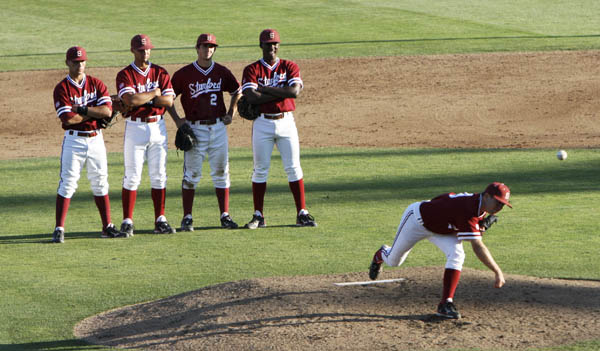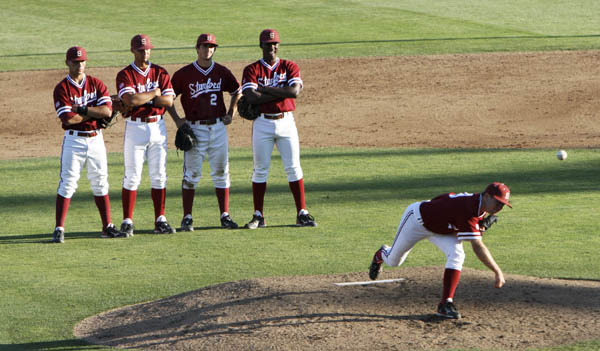The No. 13 Stanford baseball team may have swept its regional last weekend, but it still has a cross-country trip up next.
That’s a story that’s all too familiar to the Cardinal (41-16, 18-12 Pac-12), which was eliminated at No. 7 North Carolina a season ago after dominated the Fullerton regional. The Tar Heels shut down Stanford’s bats in the opener before barely escaping a Cardinal comeback the following afternoon, which featured a three-hour-and-32-minute rain delay right in the middle of a four-run Stanford rally that fell just short.
Now the Cardinal must travel to the Southeast once again, this time to face No. 3 Florida State, another experienced national seed that will benefit from playing on its home turf against a jetlagged Stanford squad. This time, at least, all three games will be played at night, a welcome departure from the sweaty afternoon opener that seemed to catch the Cardinal off guard in Chapel Hill last year.

“I just think we kind of got overwhelmed going down there,” said junior centerfielder Jake Stewart, who was drafted by the Detroit Tigers in the ninth round of this week’s MLB Draft. “It was 100 degrees with 100 percent humidity, and I think all those factors got to us.”
Stanford is also much more experienced than last year’s group, which often started seven underclassmen in the field.
“I think in some ways we were almost happy to be there,” said Stanford head coach Mark Marquess. “The expectation level last year [was], ‘Are we going to win a regional?’ Most of the players that went [to the Super Regionals] last year are back, and they’re not just happy to be there. They know we’re playing a great team, but it’s a different mindset.”
That attitude is bound to make for a competitive Super Regional between two regional hosts; only two of the eight Supers feature a pair of top seeds, and the other, coincidentally, is being played 150 miles down the road in Gainesville, between Florida and North Carolina State.
Florida State (46-15, 24-6 Atlantic Coast Conference) earned its right to host a Super Regional with one of the nation’s top records, fueled by three separate win streaks of at least seven games. The Seminoles didn’t lose a weekend series until mid-May, though they entered the NCAA tournament with a thud after failing to win a game in the ACC tournament for the first time in school history.
But those struggles seemed long behind them by the end of the Tallahassee regional, with Florida State sneaking by UAB in the opener before taking control in 8-1 and 5-2 wins over Samford.
On the season, the Seminoles are an impressive 30-5 at home, so the Cardinal will be going against the odds when it ventures into Dick Howser Stadium on Friday night.
“They’re used to winning, just like any of the great programs,” Marquess said. “Especially at home.”
Florida State is as good of an all-around squad as can be found in college baseball. Given its top-50 scoring and pitching and lack of any defensive malady, it’s easy to see why it spent a good chunk of the season as the top-ranked team in the country.
The Seminoles only have three .300 hitters, but Stanford can’t quite match up with their top two sluggers, junior Jayce Boyd (.390) and senior James Ramsey (.385). Ramsey, a 13-home-run hitter, drove in six runs in the first two games of the Seminoles’ regional, while Boyd had only three hits on the weekend.
Florida State’s two dominant freshman starters, lefty Brandon Leibrandt and righty Mike Compton, have combined for a 18-4 record and a 2.78 ERA. But head coach Mike Martin opted instead to go with junior Scott Sitz — whose 3.99 ERA is, by comparison, pedestrian — to open the ACC tournament and Florida State’s regional.
If Martin chooses to do so again, Sitz (3-3) will face off against Stanford righty Mark Appel (10-1), who has not lost a game in over three months.
“We’re prepared and I think we’ve performed under pressure all year long,” Appel said. “And we know there’s going to be a lot of pressure out there this weekend.”
The Cardinal’s hitters — besides just getting to Sitz — are going to have to put some significant pressure on either Leibrandt or Compton if Stanford wants to make it to Omaha.
Redshirt junior lefthander Brett Mooneyham was unreliable for the second week in a row last Saturday, while junior leftfielder and pitcher Stephen Piscotty gave up four first-inning runs — only one of them earned — in the eventual clincher over Pepperdine.
Luckily for Mooneyham and Piscotty, Stanford’s bats had a fairly encouraging weekend against Fresno State and Pepperdine. Sophomore first baseman Brian Ragira continued his solid sophomore season by reaching base 10 times, while sophomore rightfielder Austin Wilson knocked in five runs in key situations. Struggling juniors Kenny Diekroeger and Tyler Gaffney also showed some signs of life, even if they didn’t match that production.
Marquess expressed some concern that his team was stranding too many runners in scoring position — leaving 31 on base over the course of the regional — but two comeback wins from identical 4-0 deficits against the Waves showed that the Cardinal is on the right track.
“There have been a couple of times this year when we’ve gone down early and haven’t really come back the way we wanted to,” Stewart said. “I think this weekend really showed us that we could come together and even if . . . we’re down by four runs, we could come back and have that faith in each other and that faith in the team.
“I think if we do that, we’ll compete with anybody,” he added.
The Card will have to compete this weekend if it wants to make its first College World Series appearance since 2008.
Friday night’s opener will be played at 4 p.m. PDT and can be seen on ESPN2, along with the Super Regional. The teams then square off Saturday at 3 p.m. and, if necessary, Sunday at 4 p.m.
